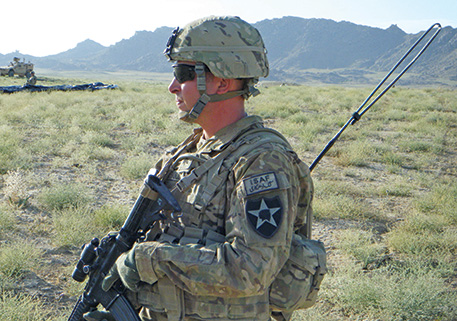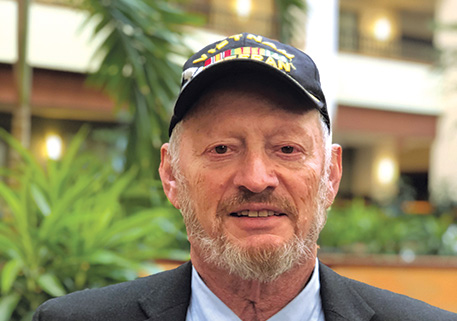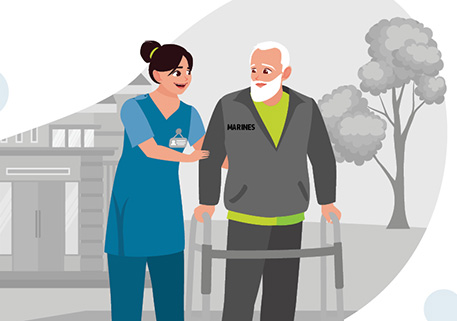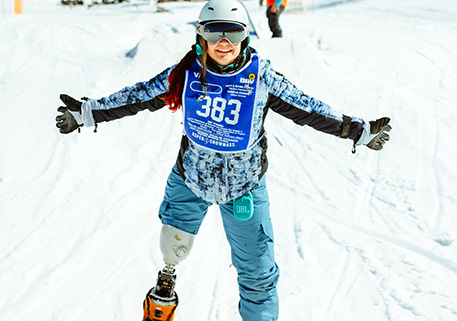Thousands will benefit from charitable fund’s new rehabilitative center in Washington state
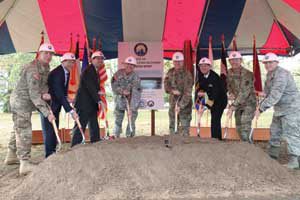 Marine Maj. Steve Taylor didn’t realize anything had changed when he returned from Afghanistan, but his family did. They noticed a significant difference in the demeanor of the man who’d come back from war. In time, he came to see what they already knew.
Marine Maj. Steve Taylor didn’t realize anything had changed when he returned from Afghanistan, but his family did. They noticed a significant difference in the demeanor of the man who’d come back from war. In time, he came to see what they already knew.
Taylor was referred to the National Intrepid Center of Excellence and it was there he began to reclaim his life after a traumatic brain injury (TBI) diagnosis.
“After drudging through a depressive year of fatigue, compounded by constant migraines, insomnia and a failing memory, I gradually accepted the fact that my capabilities were deteriorating both physically and mentally,” said Taylor at a groundbreaking ceremony for the Camp Lejeune Intrepid Spirit Center.
“More importantly, my abilities as a father and husband were being adversely affected,” he added.
According to the Defense and Veterans Brain Injury Center, 352,619 service members have been diagnosed with a TBI since 2000. However, David A. Winters, president of the Intrepid Fallen Heroes Fund, emphasized that the statistic only includes those diagnosed; some estimates put the total number of TBIs closer to 600,000.
“If TBIs are not diagnosed, then they are not treated,” said Winters. “The brain is the most complex organ in the body. If you break your arm, you get a splint for six weeks and you’re good.
The brain isn’t that easy.” The Intrepid Fallen Heroes Fund, founded in 2000, empowers veterans on the road to recovery by using private donations to construct of state-of-the-art health care centers and rehabilitation.
“We build the centers and then turn them over to the Department of Defense,” said Winters. “We can build them twice as fast and for a quarter of the cost. We are able to provide military medicine with the tools that they otherwise would not have.”
In 2007, in conjunction with the DoD, the Intrepid Fallen Heroes Fund constructed the Center for the Intrepid, a physical rehabilitation center at Brooke Army Medical Center in San Antonio. A few years later, the organization took on another critical issue facing ill and injured service members with the creation of the National Intrepid Center of Excellence, adjacent to the Walter Reed National Military Medical Center in Bethesda, Md. The facility specializes in research, diagnosis and treatment of TBI. Its success spurred the creation of nine additional centers that will provide the same life-changing care to service members and veterans with brain injuries and other psychological conditions as the National Intrepid Center of Excellence.
“Our centers are designed around a successful method of treatment, including both traditional and nontraditional therapy such as yoga and art,” Winters explained. “The patients go to the center and their spouse can come too, as family involvement is very important.”
Winters said their centers’ interdisciplinary health care approach is 90- to 92-percent effective in treating TBI, noting success is measured by a patient’s ability to continue serving in the military.
“The centralized focus of care encompassed a wide range of state-of-the-art treatment uniquely tailored to each individual,” Taylor said of his time as a patient at the center. “Within the first week, the recuperation was evident. The staff made you their priority. And at the end of four weeks, I was back—invigorated and recharged.
“The National Intrepid Center of Excellence will never fully heal the wounds of war, but what it did was provide me with the tools to overcome the barriers that have impeded me as a Marine, a father and a husband. It is a struggle but one I am prepared to take on,” he added.
The Intrepid Fallen Heroes Fund, along with its affiliated entities, has received $3.7 million from the DAV Charitable Service Trust (Trust) since it first applied for funds in 2006. The most recent grant will support the development of the rehabilitative Intrepid Spirit Center at Joint Base Lewis-McChord in Washington state.
“The grants from the DAV Charitable Service Trust mean a great deal. Each [Intrepid Spirit] center costs around $11 million. In particular, the latest grant was critical for pushing us to the top for funding of the Joint Base Lewis- McCord project and eliminated concerns of a delay due to funding down the line,” said Winters. “On a larger scale, the Trust is helping thousands at this center. Between 1,000 and 1,500 patients will be treated per year, and these men and women will avoid the terrible problems that too many veterans who haven’t been treated, unfortunately, face.”
The Trust, a 501(c)(3) nonprofit, supports physical and psychological rehabilitation programs that provide direct services to ill and injured veterans.
“For 30 years, the Trust has been giving back to the men and women who served and sacrificed through the support of programs that promote their mental, physical and emotional well-being,” said Trust President Richard Marbes. “Through the support of our generous donors, the Trust is able to help veterans, caregivers and their families when they need it most.”
The Intrepid Fallen Heroes Fund is just one of the grantees supported through the Trust in 2016.
“The Intrepid Fallen Heroes Fund and their cuttingedge medical facilities and interdisciplinary approach have resulted in unmatched progress and dedication in treating both physical and invisible wounds,” said DAV National Adjutant Marc Burgess. “The Intrepid Spirit Centers are playing an integral role for veterans on the road to recovery, and DAV is honored to support them in these life-changing efforts.”
Learn More Online
To learn more about the DAV Charitable Service Trust and its programs, visit cst.dav.org. To learn about the Intrepid Fallen Heroes Fund and the Intrepid Centers for Excellence, visit fallenheroesfund.org.



